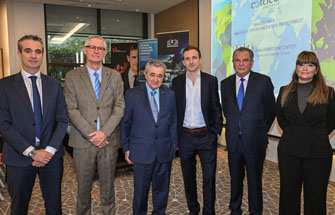In a constantly changing international economic context, the Monaco Economique Board, in partnership with Banque Populaire Méditerranée in Monaco and Gramaglia Assurances, organized a conference led by Jean-Christophe Caffet, Coface's chief economist. A candid analysis of the global economic situation, marked by geopolitical tensions, risks of recession and opportunities that can still be exploited.
An economic environment under high tension
The picture painted by Jean-Christophe Caffet is clear: the global economic outlook is dominated by uncertainty. Between the restrictive monetary policy of central banks, the disorganization of value chains and growing geopolitical tensions, companies must navigate a high-risk environment.
In the United States, the election of Donald Trump and his economic policy of massive tax cuts, increased tariffs and more flexible regulation are causing both hope and concern. While in the short term these measures could boost economic activity, their medium- and long-term impact on public debt and US inflation remains uncertain.
In Europe, the situation is more fragile. Growth remains anemic, weighed down by rising labor costs and structural inflation that is impacting the profitability of companies. The European Central Bank has begun to lower interest rates, but the investment dynamic remains insufficient to restart the economic machine.
Furthermore, the fragmentation of European economies makes it difficult to find a coordinated response to global challenges. The heterogeneity of fiscal and budgetary policies between Member States complicates the implementation of effective strategies, while productivity is struggling to regain its former dynamism.
The outlook for the eurozone remains uncertain, particularly due to the slowdown observed in Germany, the continent's economic powerhouse. Europe's manufacturing industry is going through a difficult period, especially in the automotive sector, where declining demand and the transition to electric vehicles are shaking up established business models.
A fragmented global market, between risks and opportunities
International trade is bearing the full brunt of trade tensions and the rise of protectionist policies. China, faced with a demographic and economic slowdown and trade restrictions, is seeking to redeploy its growth model. Europe, for its part, is seeing its companies confronted with an increasingly competitive environment, particularly in the face of highly competitive Asian players.
In this contrasting landscape, certain opportunities remain. Countries that produce raw materials, particularly in the energy sector, are benefiting from rising prices. Africa, although weakened by structural difficulties, remains a buoyant market for savvy investors, and only in certain countries, such as Côte d'Ivoire or South Africa. Some countries, such as Morocco, are displaying more resilient economic dynamics thanks to strategic investments and diversification of their industries.
The commodities market remains a key indicator of economic dynamics. Tensions in the energy markets, particularly gas in Europe, pose an additional challenge for manufacturers. The energy transition makes this equation even more complex, making sustainable investment decisions crucial.
The technology sector is also undergoing accelerated restructuring. The production and supply of semiconductors remain under pressure, and tensions between the major economic powers are affecting supply chains. Artificial intelligence and automation are growth drivers, but require substantial investment and a skilled workforce.
In conclusion...
The MEB conference provided an uncompromising overview of the major economic issues at stake today. In a world where the cards are constantly being reshuffled, the ability to anticipate and adapt is essential. Companies will have to be extra cautious and adjust their strategies to adapt to this changing environment.
Photo credit: MEB / P.H. Sébastien Darrasse






